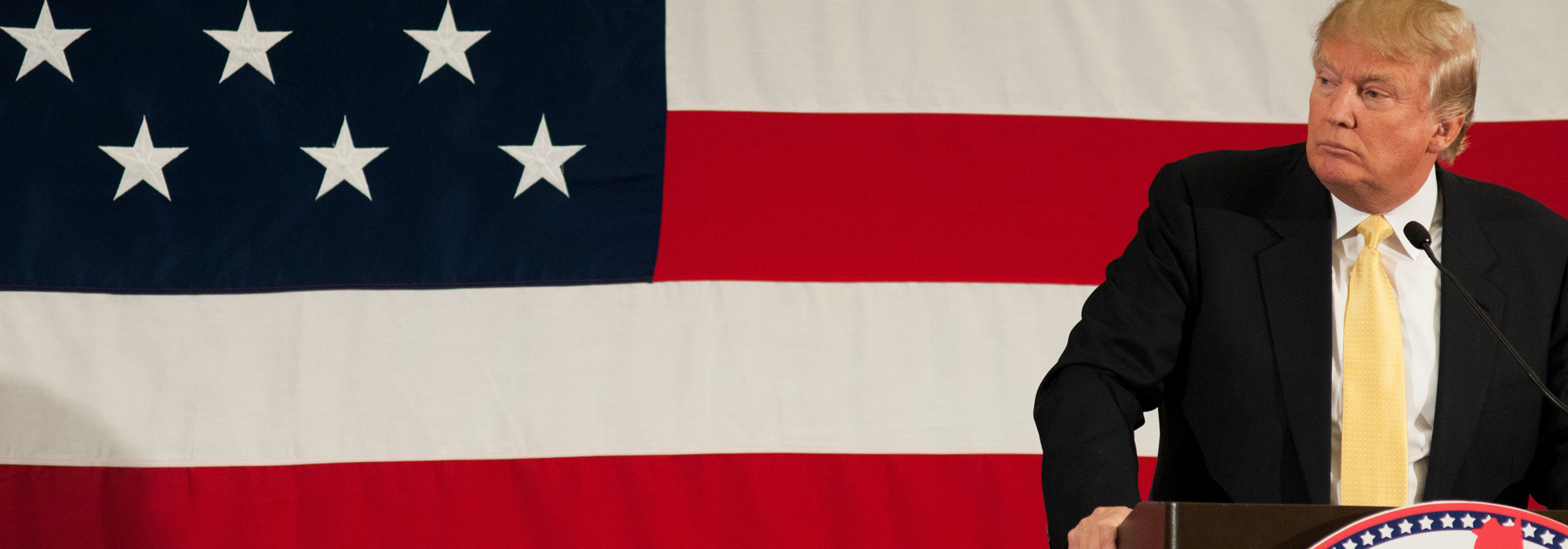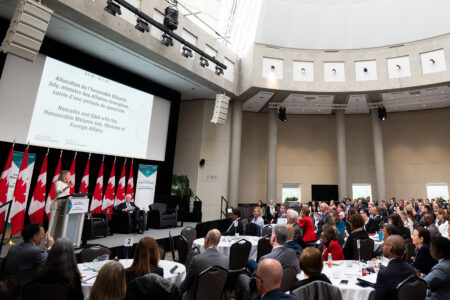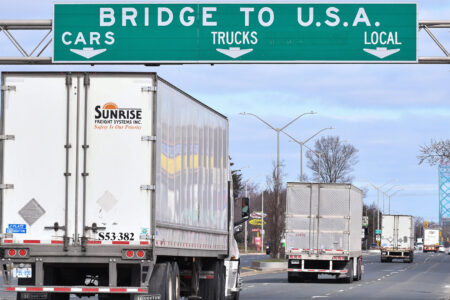
Donald Trump’s erratic management of the COVID-19 crisis has been overwhelmingly rejected by Canadians, who feel good about themselves and their leaders. The crisis has reinforced a belief in government for dealing with pressing issues. Values that inform the Canadian identity explain Canada’s different response. Whereas Trump has portrayed the virus as yet another kind of foreign invader, Canada’s chief public health officer has used the crisis to stress values of inclusion and diversity.
Canadians recoiled when Trump floated the idea of stationing troops near the Canadian border and tried to block PPE exports to Canada. Whereas Prime Minister Trudeau continued his strategy of never directly confronting the president, several premiers did not hesitate to criticize Trump.
Thus, we need to rethink the Canada-US relationship, a difficult task given the high degree of integration of our economic and security institutions. Canada’s fate, owing to decades of policy decisions, is inextricably linked to that of the United States. While Canada has benefitted from the relationship, it is in an increasingly unenviable position. Since the election of Trump, Canada has been squeezed by both China and the United States as they engage in their high-level conflict.
Trump’s “America First” policy hurts trustworthy allies including Canada as the US places its own security and interests above all else. Peter Navarro, Trump’s China hawk and chief architect of the US response to COVID-19, has quipped that no country – even an ally – would retaliate against America because its market is too large and too important. This bold prediction, based on US exceptionalism, is now being tested as America’s claims to global leadership are cast in doubt by its response to the COVID-19 crisis.
Canada has gone to great lengths to not upset President Trump, even to the point of jeopardizing its own interests. Canadian interests and sovereignty were already being undermined before the crisis, as evidenced, for example, in the renegotiated Canada-United-States-Mexico Agreement (CUSMA), which places caps on Canada’s auto sector and prevents Canada from engaging in free trade negotiations with China. With so much now at stake, can the shared institutions that mark our bilateral relationship function as intended once the first wave of the pandemic subsides?
The easy access to the US market that Canadians have always taken for granted for business, work, and tourism is now vulnerable for an unknown period. Canada must imagine a post-pandemic future balancing short-term crisis management with medium- to longer-term thinking about Canada’s relationship with the United States and its geopolitical positioning in a post-COVID-19 world.
In 1982, the last time Canada faced a major turning point regarding its position in the international political economy, the government of Pierre Elliott Trudeau created the Macdonald Commission, a wide-ranging, thorough analysis of the Canadian political economy that ultimately paved the way for free trade with the United States.
The stakes are just as high today. The COVID-19 crisis has been labelled a setback for globalization, even without considering the impact of decades of privatization and austerity on governmental ability to prepare for and respond to the crisis. Responding to the pandemic is complex and multi-faceted, as has been written about here at Policy Options.
Canada now needs a Macdonald Commission for the 21st century on Canada’s economic and political prospects in an unsettled international political economy to examine issues such as:
The thickened border: We do not know how long the thickened border will last. The unpredictable nature of the virus means that economic and border shutdowns could happen at any moment. The USA has a disproportionate number of COVID-19 cases and deaths and is vulnerable to subsequent waves, given pressures to reopen the economy rapidly. Trump has threatened to tighten immigration considerably in the coming months. With the historically high levels of daily cross-border traffic, what does this mean for a fluid border and for Canada’s approach to cross-border relations? Supply chains in the short term are functioning, but the curtailment of business travel, cross-border workers, and tourism will affect our highly integrated economies. Canadian leaders and business have adopted a cautious outlook for reopening the border. Holding the line on investments in shared projects should be foremost in the Canadian government’s mind as it engages in a little economic nationalism and develops national infrastructure.
Rethinking the carbon economy: The Trudeau government has struggled to balance energy exploitation for economic purposes with its largely unrealized climate change goals. With the price of crude cratering, making much of Canada’s oil uneconomic, Alberta Premier Jason Kenney advocates for a new North American energy strategy. Alberta’s Energy Minister Sonya Savage said Alberta is losing its patience waiting for federal aid for the energy sector. Meanwhile, the crisis has demonstrated that dramatic actions can have an immediate impact on the environment. Canada must now envision a post-carbon economy under these circumstances.
Multilateralism: Canada overwhelmingly relies on the USA for security. Simultaneously tighter integration has made Canada more vulnerable to American whims. Before the pandemic, the Trump administration was already flexing its muscles, pushing allies to invest more in defence while questioning the value of NATO. Shared institutions were leveraged to US advantage. America’s national security became an economic sledgehammer in NAFTA renegotiations. There is ongoing pressure on Canada to reject Huawei, for example, or risk being cut out of 5G infrastructure development and investment.
Looking ahead means rethinking the geopolitical landscape. Since the Second World War, our multilateral engagement has focused on the dominance of an established power (the US) and the institutions it has upheld. With “America First,” the USA is using its economic and military force to not only promote its interests but to undermine the very institutions it helped build. Canada must not only invest in revitalizing global institutions, but help develop new ones, especially if America continues to withdraw from key organizations and global compacts such as the World Health Organization, the Paris Climate Agreement, the United Nations, the World Trade Organization and the International Criminal Court. This is not an ideological goal but one driven by necessity. Canada’s future economic prosperity will be driven by the shifting global economy, not by its integration with the US. That means being competitive with emerging markets and working with countries whose values we do not necessarily share.
Accepting the end of the special relationship and promoting Canadian interests: The Trump administration has eroded the bilateral goodwill between nations. The suggestion that Canada and the US still have a special relationship and that we are in this fight together now seems quaint if not naïve. Trump has made no effort to appoint an ambassador to Canada since Kelly Craft moved to the UN almost a year ago. It is not clear how much more US exceptionalism allies like Canada can tolerate, especially if Donald Trump is re-elected. Unfortunately, asymmetries in power and ability place considerable political pressure on Ottawa to initiate change, resulting in a bias towards preserving the status quo. An unpredictable larger partner requires Canada to consider new ways to promote its interests as it stands up for what it believes is right.
Some might say that Trump will not be president forever, but this transformation will persist well after he leaves office, and Canadian politics cannot help but become divided over it. For some, this is the time to transition to a multilateral, post-carbon Canada, working with allies and trading partners for sustainable prosperity. For others, even during the crisis, the carbon tax remains front and centre, and they believe we need to invest more than ever in energy, with tighter integration remaining a key option. Thus, rethinking our post-pandemic future must deal not only with the national agenda but Canada’s international agenda as well.
This article is part of the The Coronavirus Pandemic: Canada’s Response special feature.
Photo: Donald Trump in Nashua, New Hampshire, in 2015. Shutterstock.com, by Andrew Cline










